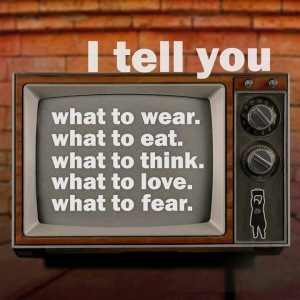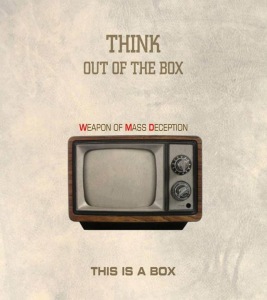Last year I was asked to give a talk at a high school girls retreat on modesty. This was not just modesty in dress, but in thought and behaviour as well. While preparing for the talk I came across two images that saw me take my talk in a very different direction.
The images were simply this, and perhaps you have seen them yourself:
These made me stop and think. Now, I have to admit that I don’t watch a lot of television, including movies. To be honest, I’ve always found reading much more appealing. I also found that there were not a lot of shows on television that I found interesting, or worthwhile to watch. I should stop here that I have always preferred the written word because it encourages you to use your imagination, television imagines for you.
But, my husband and my children enjoy watching television, though the kids are limited to a certain amount per day and I often put a DVD on instead for them because a). we have approved the content and b). it has a definite conclusion so there’s usually no argument about watching one more show.
So then, what place does television have in our lives, and how much influence does it really have?
Well, let me ask you the following questions:
- Where do our ideas about life, relationships and normalcy come from?
- Does a G or PG rating mean that the content is morally sound?
- How much television is the average Australian child consuming each day?
The truth is that the secular media is toxic and we need to proceed with caution. Plainly speaking, the vast majority of what is available for consumption in the secular media is not morally healthy. Just because a sinful activity has been accepted by the mainstream as normal does not make it any less sinful! Take popular sitcoms like Modern Family and Two and a Half Men for example, which exhibit appalling moral behaviour through character relationships and yet this is generally accepted by the viewing public as relatively benign and normal. Promiscuity without consequence and the normalisation of homosexual unions are depicted as being typical and ordinary in the real world.
The Simpsons, which began as a satirical depiction of contemporary life and used its audience to explore the morals, ethics and politics of capitalist America has, with new writers, become little more than a half hour of nonsense that relies on toilet humour and lame gags.
Even those shows which are more family friendly still exhibit the same old cinematic lies such as premarital sex being akin to love and teenage rebellion including underage drinking as a rite of passage. The fashion choices of television stars is often copied; think the ‘Rachel’ haircut of the early 2000s from the Friends television show, and the bohemian style of Nina from Offspring has been widely copied.
In his address at the World Meeting of Families in Mexico City in January 2009, entitled ‘Family and Mass Media’, Prof. Norberto Gonzales Gaitano shared these statistics: 70% of all television shows have sexual content, 17% of websites are pornographic, 25% of searches are for pornography and 40% songs have explicit sexual content.
At first glance to 70% seems unrealistic but it is accurate. Because, over generations, we have become desensitised to sexual references, our tolerance levels are higher than they should be. Even G rated shows have, on occasion, included sexual allusions and family friendly movies such as Shrek are designed to suit an older audience as well as the younger market and their sexual allusions are generally more obvious but go over the kids’ heads.
Television effectively brainwashes its audience into believing that what they are watching is a realistic depiction of life. They empathise with the characters and connect with them emotionally. They are often designed to confront, to provoke a reaction. And all the while they project subliminal messages about what constitutes normal and by the time we are called to speak on social issues we have already had our morals – if we had any to begin with – ebbed away by what we have viewed on television.
Some will not agree with this article, and consider me to be too hard in my critique of television, and pop culture in general. But at the end of the day, the culture we live in is absorbing an alarming rate of television, and our morals are in sharp decline. I don’t think it’s too hard to find a tangible connection there.
I’ll finish with the words of Roald Dahl: ‘So please, oh please, we beg, we pray, go throw your TV set away, and in its place you can install, a lovely bookcase on the wall.’
Share your thoughts below!
Originally posted 2014-11-13 22:33:56.



You won’t get me disagreeing with you Emily! When we got married, we deliberately didn’t get a TV and we have no missed it one bit. If we do find something we think worthwhile to watch, we watch it online or on DVDs which means we spend less time (or no time) watching ads and can watch it on our own schedule. I’ve also been pondering lately about how sitcoms make us laugh about things that are actually very grave sins eg. Barney’s promiscuous antics in ‘How I Met Your Mother’. I’ve also been pondering about how scripture tells us to fill our minds with things that are holy, and that secular TV shows can fill our minds (and our time!) with things that are not only not holy, but of no spiritual benefit. Surely there are more worthwhile pursuits that we can take up to help us wind down in the way that some people use TV to do?